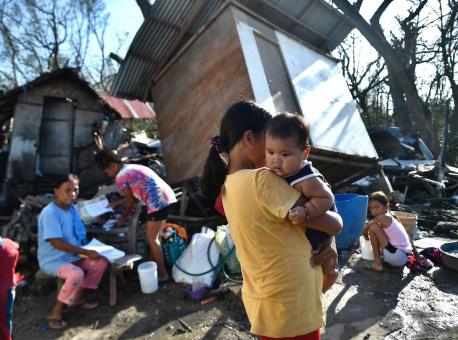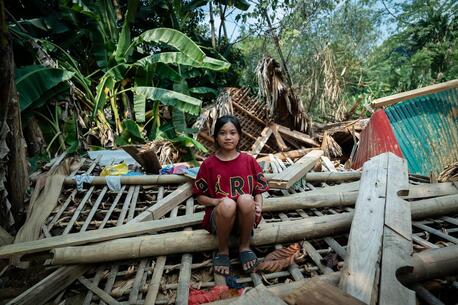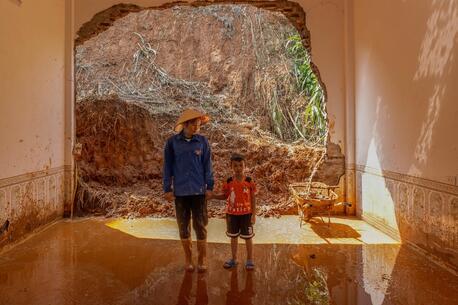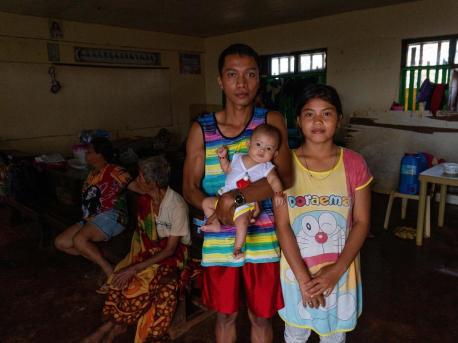
UNICEF Rushes Aid to Philippines After Super Typhoon Rai
After yet another devastating storm in the Philippines, UNICEF and partners are on the ground, providing urgent assistance and keeping the needs of children front and center.
Early estimates show 946,097 children need urgent assistance after Super Typhoon Rai struck the southeastern part of the Philippines on December 16. The equivalent of a Category 5 hurricane in the United States, the powerful storm battered several regions with sustained winds of 120 miles per hour near the center and gusts of up to 168 miles per hour.
Known as Typhoon Odette locally, the storm is the 15th major weather disturbance to hit the Philippines in 2021
Surging floodwaters and landsliides destroyed homes and cut off communities, leaving families struggling to survive. Immediate needs include food, safe water, medicines, clothing, cooking equipment, personal protective gear (PPE), family kits with sleeping materials, hygiene kits, temporary shelter, disaster kits and tents for health care facilities.

UNICEF staff and logistics support personnel unload emergency supplies from the UNICEF Mindanao warehouse for children and families in urgent need after Super Typhoon Rai hit the Philippines on December 16, 2021. © UNICEF/UN0569033/Nonoy Casiple
UNICEF staff is on the ground distributing emergency supplies, conducting assessments and leading the water, sanitation and hygiene (WASH), nutrition, education and child protection clusters together with the Philippine government and partners. The first shipments of emergency supplies were dispatched from UNICEF's Mindanao field office in Cotabato City to Dinagat Islands, Siargao, Surigao City and Surigao del Norte to aid families in crisis, including:
- around 2,000 family hygiene and dignity kits containing essentials such as water buckets, soap, toothpaste and sanitary napkins
- 2,767 packs of water purification tablets
- 2,018 bottles of household disinfectant
- 2 collapsible bulk water storage containers
- 50 emergency latrine kits
- 25 tents for district hospitals and rural health units

Residents salvage belongings from their destroyed homes in the coastal town of Dulag in Leyte province on December 17, 2021, a day after Super Typhoon Rai hit. © UNICEF/UN0568095/
According to the December 22 UNICEF Philippines situation report, an estimated 12 million children in 11 regions were affected as educational activities were interrupted or suspended in approximately 30,000 schools. The storm left 227 cities and municipalities without electricity and disrupted network service in 135 locations.
Children and families need help now
UNICEF is calling for the prioritization of children's needs in all facets of the emergency response. The pandemic has exacerbated children's health issues and children and young people are among the most vulnerable to the devastating effects of climate-related disasters.
“Our hearts are with the children and their families who were affected by the typhoon. Many children will spend the holidays without a roof over their heads, hungry, cold and in emotional distress. UNICEF is working hard to respond to their urgent needs, together with the government and our partners,” UNICEF Philippines Representative Oyunsaikhan Dendevnorov said.
Help children and families in the Philippines by donating now.
TOP PHOTO: Residents gather next to their destroyed house in Carcar, Cebu province, the Philippines on December 18, 2021, days after Super Typhoon Rai hit the city. © UNICEF/UN0569267/Kinta
HOW TO HELP
There are many ways to make a difference
War, famine, poverty, natural disasters — threats to the world's children keep coming. But UNICEF won't stop working to keep children healthy and safe.
UNICEF works in over 190 countries and territories — more places than any other children's organization. UNICEF has the world's largest humanitarian warehouse and, when disaster strikes, can get supplies almost anywhere within 72 hours. Constantly innovating, always advocating for a better world for children, UNICEF works to ensure that every child can grow up healthy, educated, protected and respected.
Would you like to help give all children the opportunity to reach their full potential? There are many ways to get involved.





